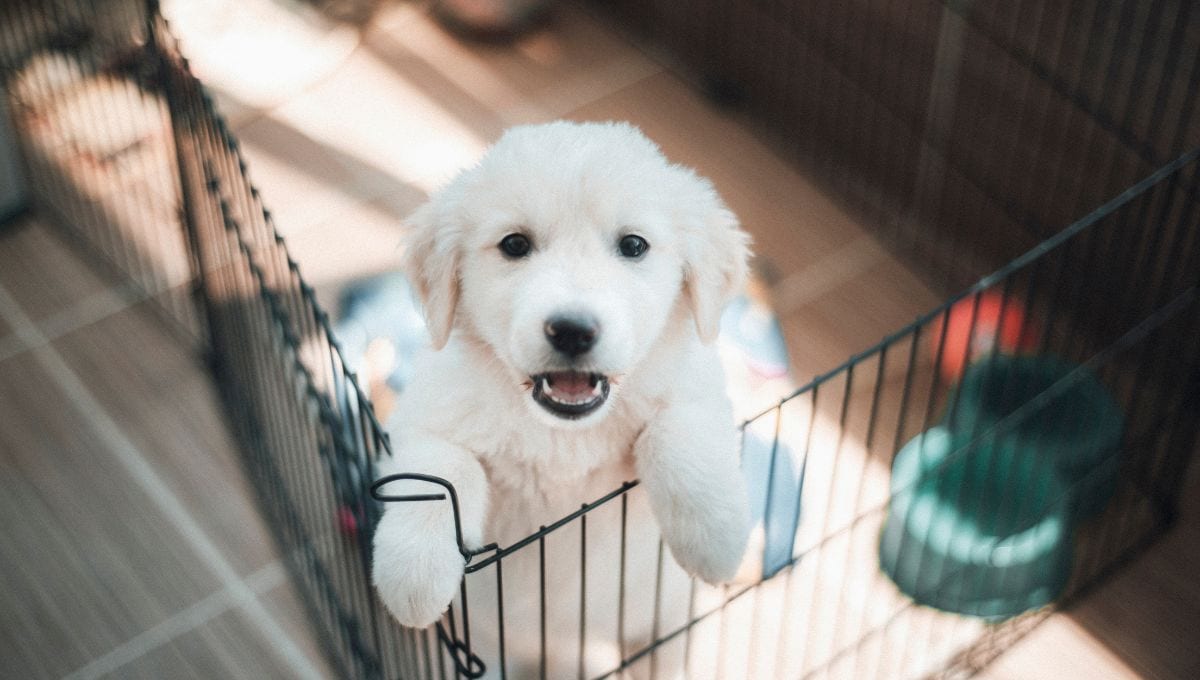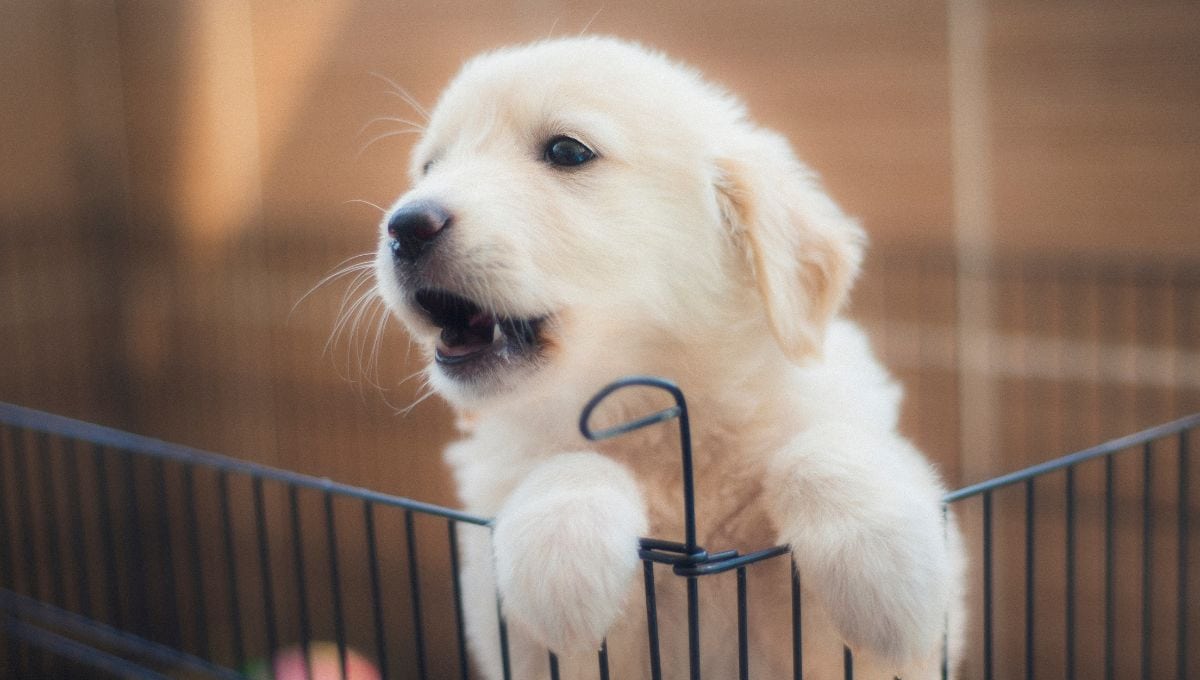At What Age Should a Puppy Be Housebroken? A Guide to Potty Training Your Furry Friend
When it comes to bringing a new puppy home, one of the most important things to consider is housebreaking. Housebreaking is the process of teaching a puppy to go to the bathroom outside or in a designated area indoors. This can be challenging, but it is crucial for the health and happiness of the puppy and their owners.

The question of when to start housebreaking a puppy is common among new dog owners. Some believe that puppies can be housebroken as early as 8 weeks old, while others suggest waiting until the puppy is 6 months or older. The truth is that there is no one-size-fits-all answer to this question, as every puppy is different and may develop at their own pace.
Based on my personal experience and the advice of our veterinarian, you should find success housebreaking your dog between 12 and 16 weeks of age.
However, we start the process as soon as we get a new puppy home by establishing a consistent routine of feeding, play, sleep and potty breaks. It’s better to establish good habits from the beginning vs. trying to correct them later.
However, a few general guidelines can help determine when a puppy is ready to begin the housebreaking process. These include observing the puppy’s behavior, monitoring their bathroom habits, and being consistent with training.
By following these tips and being patient with the process, owners can successfully housebreak their puppy and enjoy a happy, healthy relationship with their furry friend.
Suggested Reading: How Long Does It Take To Potty Train A Golden Retriever or potty train a Labrador Retriever?
Understanding Puppy Development
When it comes to housebreaking puppies, understanding their development is crucial. Puppies go through several stages of development, and each stage presents unique challenges for housebreaking. Here are the key stages of puppy development:
- Neonatal stage: This stage lasts from birth to two weeks. During this stage, puppies are blind, deaf, and unable to regulate their own body temperature. They rely entirely on their mother for survival and do not eliminate on their own.
- Transitional stage: This stage lasts from two to four weeks. Puppies begin to open their eyes and ears and develop teeth. They also start to eliminate on their own, but still rely on their mother for most of their needs.
- Socialization stage: This stage lasts from four to twelve weeks. Puppies become more independent and start to explore their environment. They also begin to learn social skills and how to interact with other dogs and humans. This is a critical stage for housebreaking, as puppies can start to learn basic commands and routines.
- Juvenile stage: This stage lasts from three to six months. Puppies become more confident and assertive and may start to challenge their owners. They also continue to learn and refine their social skills.
- Adolescent stage: This stage lasts from six months to two years. Puppies become more independent and may start to test boundaries. They also continue to develop physically and mentally.
It’s important to note that each puppy is unique and may progress through these stages differently.
Some puppies may be fully housebroken by four months, while others may take up to a year or longer.
Patience and consistency are key when housebreaking a puppy, and it’s important to set realistic expectations based on your individual puppy’s development.

Housebreaking Basics
Housebreaking a puppy is an essential part of pet ownership. It can be a challenging task, but with patience and consistency, it can be accomplished.
Here are some basic tips to help you get started:
- Establish a routine: Puppies thrive on routine, so it’s important to establish a consistent feeding schedule, sleeping, and going outside.
- Take your puppy outside frequently: Puppies have small bladders and must go outside often. Take your puppy outside first thing in the morning, after meals, and before bedtime. Also, take your puppy outside after playtime or any other activity that may stimulate them.
- Choose a designated potty spot: Choose a specific spot in your yard where you want your puppy to go potty. This will help your puppy associate that spot with going potty and make it easier to train them.
- Keep your puppy on a leash: When you take them outside, keep them on a leash. This will help them stay focused and prevent them from wandering off and getting distracted.
- Use positive reinforcement: When your puppy goes potty outside, give them lots of praise and a treat. This will help them associate going potty outside with positive experiences.
Remember, housebreaking a puppy takes time and patience. Don’t get discouraged if your puppy has accidents inside.
Your puppy will eventually learn to go potty outside with consistency and positive reinforcement.

At What Age Should You Start Housebreaking Your Puppy?
Housebreaking a puppy is a crucial part of the training process. It teaches the puppy where to eliminate and establishes good habits for the future.
The ideal age to start housebreaking your puppy is between 12 and 16 weeks. The puppy has developed enough control over their bladder and bowel movements at this age.
It’s important to note that every puppy is different; some may take longer to develop bladder and bowel control.
If you have a small breed puppy, they may need to go outside more frequently than a larger breed puppy. Similarly, if you have a puppy with health issues, they may require more frequent bathroom breaks.
When starting the housebreaking process, it’s essential to establish a routine. Take your puppy outside first thing in the morning, after meals, and before bedtime.
Praise your puppy when they eliminate outside, and use a cue word such as “potty” or “go pee” to associate the action with the word.
If accidents happen inside, never punish your puppy. Instead, clean up the mess and take them outside immediately.
Consistency and patience are key when housebreaking a puppy, and it may take several weeks or even months for them to establish good habits.
Signs Your Puppy Needs to Go Out
Housebreaking your puppy can be challenging, but it is essential for a happy and healthy life for you and your furry friend.
One of the most important things to remember when housebreaking your puppy is to recognize the signs that your puppy needs to go out.

Here are some common signs to look out for:
- Pawing at the door or scratching the floor
- Whining or barking
- Circling or sniffing the floor
- Restlessness or pacing
- Sitting or staring at you
If you notice any of these behaviors, it’s time to take your puppy outside.
Remember, puppies have small bladders and must go out frequently, especially after eating, drinking, playing, or sleeping.
Taking your puppy out first thing in the morning and before bedtime is also important.
Consistency is key when it comes to housebreaking your puppy. Establish a routine and stick to it. Take your puppy out at the same times every day and praise them when they go potty outside.
If your puppy has an accident inside, don’t punish them. Simply clean it up and try to prevent it from reoccurring by taking them out more frequently or supervising them more closely.
With patience, consistency, and positive reinforcement, your puppy will be housebroken in no time. Remember to watch for these signs and take your puppy out frequently to set them up for success.
Tips for Successful Housebreaking
Housebreaking a puppy can be challenging, but it’s an essential part of puppy training.
Here are some tips to help make the process smoother:
- Establish a routine: Puppies thrive on routine, so it’s important to establish a regular schedule for feeding, potty breaks, and playtime. Stick to the schedule as closely as possible to help your puppy learn when it’s time to go potty.
- Choose a designated potty area: Designate a specific area in your yard or outside your apartment for your puppy to use for potty breaks. Take your puppy to this area every time they need to go potty.
- Use positive reinforcement: Praise and reward your puppy every time they go potty in the designated area. This will help them associate going potty in that area with positive experiences.
- Supervise your puppy: When your puppy is not in their crate, keep a close eye on them to prevent accidents. If you see them sniffing around or circling, take them to the designated potty area immediately.
- Be patient: Housebreaking can take time and accidents will happen. Be patient with your puppy and continue to reinforce positive behavior.
By following these tips, you can help ensure that your puppy is successfully housebroken and ready to enjoy their new home.

Common Housebreaking Mistakes to Avoid
Housebreaking a puppy can be challenging, but it’s important to avoid common mistakes that can make the process even more difficult.
Here are a few mistakes to avoid:
- Punishing your puppy: Punishing your puppy for accidents will only confuse and scare them. Instead, focus on positive reinforcement and rewarding good behavior.
- Inconsistency: Consistency is key when it comes to housebreaking. Make sure everyone in the household is on the same page and using the same commands and routines.
- Not supervising your puppy: It’s important to keep an eye on your puppy at all times, especially during the housebreaking process. If you can’t supervise them, confine them to a safe area.
- Waiting too long to take your puppy outside: Puppies have small bladders and need to go outside frequently. Don’t wait too long to take them out, or accidents are likely to occur.
- Not cleaning up accidents properly: It’s important to clean up accidents thoroughly to remove any odor, or your puppy may continue to go in the same spot.
By avoiding these common mistakes, you can make the housebreaking process smoother and more successful for both you and your puppy.
Related Reading
Our Tip 10 Picks For Best Dogs Products *[All are Banks (our Golden) Approved!]
- How Long Does It Take To Potty Train A Golden Retriever
- How Long Does It Take to Potty Train a Labrador Retriever
- How Often Do Golden Retrievers Pee And Poop
- When Do Golden Retrievers Sleep Through the Night
- How Often Do Labrador Retrievers Pee and Poop
- What Do I Do If My Golden Retriever Has Diarrhea
- How Much Water Should a Labrador Retriever Puppy Drink
Conclusion
Housebreaking a puppy can be challenging but essential for a peaceful and clean home. The process of housebreaking a puppy can take time and patience, and it is important to start early.
Based on our research, the ideal age for housebreaking a puppy is between 12 to 16 weeks.
However, it is important to note that every puppy is different, and some may take longer to learn than others. It is crucial to be consistent with training and to reward good behavior.
Remember, housebreaking a puppy requires effort and dedication, but it is worth it in the long run. With proper training and patience, your puppy will learn to be a well-behaved and happy member of your family.






